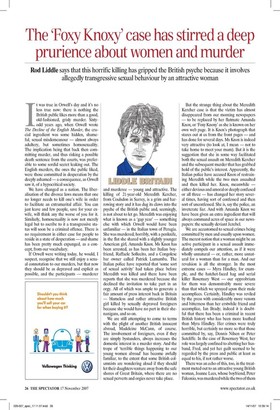The 'Foxy Knoxy' case has stirred a deep prurience about women and murder
Rod Liddle says that this horrific killing has gripped the British psyche because it involves allegedly transgressive sexual behaviour by an attractive woman 1 t was true in Orwell's day and it's no less true now: there is nothing the British public likes more than a good, old-fashioned, grisly murder. Sixtyodd years ago, when Orwell wrote The Decline of the English Murder, the crucial ingredient was some hidden, shameful, sexual misdemeanour — almost always adultery, but sometimes homosexuality. The implication being that back then committing murder, and thus risking a possible death sentence from the courts, was preferable to some sordid secret leaking out. The English murders, the ones the public liked, were those committed in desperation by the deeply ashamed — a consequence, as Orwell saw it, of a hypocritical society.
We have changed as a nation. The liberalisation of the divorce laws means that one no longer needs to kill one's wife in order to facilitate an extramarital affair. You can just leave and few people, save for your exwife, will think any the worse of you for it. Similarly, homosexuality is now not merely legal but to ascribe to it a transgressive status will soon be a criminal offence. There is no requirement in either case for people to reside in a state of desperation — and shame has been pretty much expunged, as a concept, from our vocabulary.
If Orwell were writing today, he would, I suspect, recognise that we still enjoy a sexual connotation to our murders, but that now they should be as depraved and explicit as possible, and the participants — murderer and murderee — young and attractive. The killing of 21-year-old Meredith Kercher, from Coulsdon in Surrey, is a grim and harrowing story and it has dug its claws into the psyche of the British public and, seemingly, is not about to let go. Meredith was enjoying what is known as a 'gap year' — something else with which Orwell would have been unfamiliar — in the Italian town of Perugia. She was murdered, horribly, with a penknife, in the flat she shared with a slightly younger American girl, Amanda Knox. Ms Knox has been arrested, as has been her Italian boyfriend, Raffaele Sollecito, and a Congolese bar owner called Patrick Lumumba. The Italian police have reported that 'some sort of sexual activity' had taken place before Meredith was killed and there have been reports that she was murdered because she declined the invitation to take part in an orgy. All of which was ample to generate a fair amount of press interest back in Britain — blameless and rather attractive British girl killed by sexually depraved foreigners because she would have no part in their shenanigans, and so on.
We are still attempting to come to terms with the plight of another British innocent abroad, Madeleine McCann, of course. The involvement of foreigners, even if they are simply bystanders, always increases the domestic interest in a murder story. And the trope of 'terrible things happening to our young women abroad' has become awfully familiar, to the extent that some British columnists are wondering aloud if they should let their daughters venture away from the safe shores of Great Britain, where there are no sexual perverts and orgies never take place.
But the strange thing about the Meredith Kercher case is that the victim has almost disappeared from our morning newspapers — to be replaced by her flatmate Amanda Knox, or 'Foxy Knoxy' as she is known on her own web page. It is Knox's photograph that stares out at us from the front pages — and has done for several days. Ms Knox is indeed very attractive (to look at, I mean — not to take home to meet your mum). But it is the suggestion that she in some way facilitated both the sexual assault on Meredith Kercher and the subsequent murder that has grabbed hold of the public's interest. Apparently, the Italian police have accused Knox of restraining Meredith while the two men assaulted and then killed her. Knox, meanwhile — either devious and amoral or deeply confused or all three — has changed her story several times, having sort of confessed and then sort of unconfessed. She is, say the police, an inveterate liar. And with Amanda Knox we have been given an extra ingredient that will always command acres of space in our newspapers: the sexually deviant Jezebel.
We are accustomed to sexual crimes being committed by men and usually upon women. The merest notion that a woman might be an active participant in a sexual assault immediately compels our attention, as if it were wholly unnatural — or, rather, more unnatural for a woman than for a man. And our revulsion is all the stronger. In the most extreme cases — Myra Hindley, for example, and the hatchet-faced hag and serial killer Rosemary West — our opprobrium for them was demonstrably more severe than that which we sprayed upon their male accomplices. Certainly, Hindley was reviled by the press with considerably more venom and bitterness than her erstwhile friend and accomplice, Ian Brady; indeed it is doubtful that there has been a criminal in recent British history who has been more loathed than Myra Hindley. Her crimes were truly horrible, but certainly no more so that those committed by, say, Dennis Nilsen or Peter Sutcliffe. In the case of Rosemary West, her role was largely confined to abetting her husband, Fred, and yet her guilt seemed to be regarded by the press and public at least as equal to his, if not rather worse.
There was an echo of this, too, in the treatment meted out to an attractive young British woman, Joanne Lees, whose boyfriend, Peter Falconio, was murdered while the two of them were backpacking across Australia. When it emerged that Ms Lees had, at some point, enjoyed an extracurricular sexual relationship during her affair with Mr Falconio, the hounds of hell were let loose on the woman; there were even dark murmurings that she may have been in some way complicit in the killing of her boyfriend. As if to imply that if she were capable of cheating on her boyfriend, then, hell knows, she might well be capable of anything. It was a bizarre and cruel pursuit of a woman who had committed no crime whatsoever. She was even given a grilling about it all on the Today programme.
And I suppose there's another echo of it in the way in which the media began to swing its guns around on to Kate McCann, fuelled by reports in the Portuguese papers of 'swinging parties' and the like. Again, the readiness to believe that she might have been capable of harming her own daughter was suggested by allegations of a sybaritic lifestyle.
None of this should be taken to imply any conclusion about Amanda Knox's involvement in the murder of Meredith Kercher; frankly, I haven't a clue either way, and nor — it would seem — has anyone else. As far as we can tell she has lied to the police, which would seem to indicate, to me at least, that she has something to hide. It may well be that the police have, by now, got her bang to rights. But it is less the lying that has attracted the interest of the British press than the insinuation that she was an extremely sexually active young lady and that her sexual activities were not entirely confined to a safe, monogamous relationship with one man. A predatory sexual instinct is something we are perfectly at ease with when it refers to men; when it is a term applied to a woman then we seem to find it all a little hard to swallow and, on occasions, our imaginations get the better of us. In other words, we will shrug our shoulders at supposedly transgressive sexual behaviour from men, but not from women. And yet there is no great evidence to suggest that women are any better behaved than men these days.
Nothing ignites our interest in a story quite so much as a woman who ceases to be a victim or recipient of male sexual advances, but who is instead revealed as an accomplice or instigator. It turns our expectations around and once we have labelled her thus we find it easy to believe that she might be capable of absolutely anything. A certain amount of hypocrisy, then, is still required for us to enjoy a good murder story, just as it was in Orwell's day.





































































 Previous page
Previous page